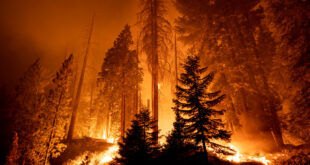By Ying Zhu
Climate change, driven by human activities, is an ever-present challenge facing our planet today. Beyond the well-known effects such as rising temperatures, melting ice caps, and extreme weather events, climate change also manifests in subtle yet significant ways. One such consequence is the alteration of ocean color, a phenomenon that offers vital clues to the health of marine ecosystems.
The color of the ocean is not merely a picturesque attribute; it holds crucial information about the state of marine ecosystems. The ocean appears blue due to the selective absorption and scattering of sunlight by water molecules. However, other factors, such as the presence of phytoplankton, dissolved organic matter, and suspended particles, can influence the color of seawater.
Phytoplankton, microscopic marine plants, play a fundamental role in the marine food web and are responsible for a significant portion of Earth’s oxygen production. They contain pigments, such as chlorophyll, which absorb sunlight for photosynthesis. As a result, areas with high phytoplankton concentrations may exhibit a greenish tint, especially near coastlines and upwelling zones where nutrient-rich waters promote their growth.
Climate Change’s Impact on Ocean Color
- Warming Ocean Temperatures: Climate change-induced warming leads to alterations in ocean circulation patterns, affecting nutrient distribution. These changes can result in shifts in phytoplankton populations, leading to variations in ocean color.
- Ocean Acidification: Rising levels of atmospheric carbon dioxide are absorbed by the ocean, leading to ocean acidification. Acidification can alter the availability of nutrients and affect phytoplankton growth, potentially disrupting their distribution and impacting the overall ocean color.
- Melting Glaciers: The melting of glaciers releases freshwater into the ocean, creating stratification, or layering of water with different densities. This can impede nutrient mixing between the layers, limiting phytoplankton growth and altering ocean color in polar regions.
- Changes in Precipitation Patterns: Climate change influences rainfall patterns, leading to changes in river runoff and the influx of terrestrial nutrients into coastal waters. These alterations can impact phytoplankton growth and ocean color in affected regions.
Ocean color change, while subtle to the human eye, can have far-reaching consequences for marine ecosystems:
- Disruptions in the Food Chain: Phytoplankton form the base of the marine food chain, and changes in their abundance and distribution can have cascading effects on marine life, from zooplankton to fish, marine mammals, and even seabirds.
- Oxygen Production and Carbon Sequestration: Phytoplankton are crucial for oxygen production and carbon sequestration. Any disruption in their populations can affect the planet’s overall oxygen levels and its capacity to mitigate carbon dioxide emissions.
- Loss of Biodiversity: Alterations in phytoplankton distribution can favor certain species over others, leading to imbalances in marine biodiversity and potentially causing the decline or loss of some species.
- Impact on Fisheries: Changes in phytoplankton distribution and abundance can affect fish populations, impacting fishing industries and coastal communities dependent on them for sustenance and livelihoods.
The subtle yet significant changes in ocean color as a result of climate change provide crucial insights into the state of marine ecosystems. The alterations in phytoplankton populations and nutrient availability not only affect the visual appeal of our oceans but also have far-reaching consequences for marine life, biodiversity, and global processes such as oxygen production and carbon sequestration. Recognizing these signs can drive greater awareness and, in turn, encourage collective action to mitigate climate change and safeguard the delicate balance of life beneath the waves. Embracing sustainable practices and supporting conservation efforts is imperative to preserve our oceans for generations to come.
 Tempus Magazine By Students, For Students
Tempus Magazine By Students, For Students 



